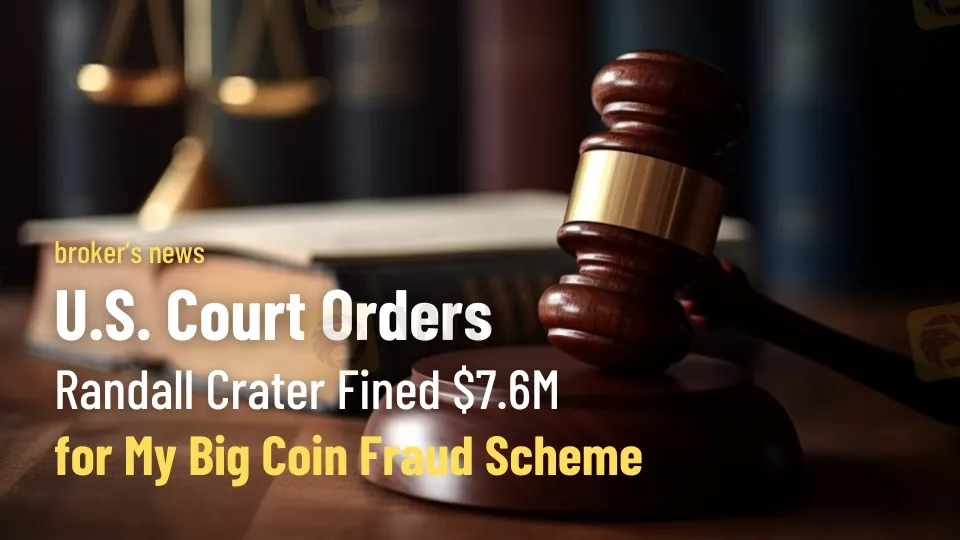简体中文
繁體中文
English
Pусский
日本語
ภาษาไทย
Tiếng Việt
Bahasa Indonesia
Español
हिन्दी
Filippiiniläinen
Français
Deutsch
Português
Türkçe
한국어
العربية
U.S. Court Orders Randall Crater Fined $7.6M for My Big Coin Fraud Scheme
Abstract:Randall Crater was fined $7.6M for My Big Coin fraud, banned from trading, and sentenced to prison in a landmark CFTC enforcement action.

The United States Commodity Futures Trading Commission (CFTC) has obtained a consent order against Randall Crater of Heathrow, Florida, for his role in a fraudulent digital asset scam. The United States District Court for the District of Massachusetts ordered Crater to pay over $7.6 million in reparations to people cheated by his My Big Coin (MBC) scam.
The settlement decree, which addresses the CFTC's allegations against Crater, also includes a permanent injunction prohibiting him from trading in CFTC-regulated markets, transacting with digital asset commodities, or registering with the CFTC. This ruling followed a concurrent criminal case in which Crater was sentenced to more than eight years in jail and had to pay $7.6 million in restitution and forfeiture.
From January 2014 to January 2018, Crater and his co-defendants ran a fraudulent enterprise that marketed My Big Coin as a fully working virtual currency backed by gold. Crater misled at least 28 consumers by making false statements regarding the value, trading status, and usability of MBC, stealing more than $7.6 million. He used the money to buy luxury things including a house, antiques, fine art, and jewelry.
The CFTC's action against Crater's co-defendants—Mark Gillespie, My Big Coin Pay, Inc., My Big Coin, Inc., John Roche, and Michael Kruger—is still pending. The CFTC has warned that, while restitution orders are intended to recoup lost monies, plaintiffs may not always get full compensation due to insufficient assets retained by wrongdoers.
This lawsuit demonstrates the CFTC's commitment to combatting digital asset theft and protecting consumers. Crater's conviction and punishment in the related criminal case emphasize the gravity of his acts. On July 21, 2022, he was convicted of wire fraud, illegal monetary transactions, and running an unregistered money-transmitting company.
The CFTC continues to prioritize prosecuting fraudsters responsible and ensuring the integrity of digital asset markets. Victims of such scams are advised to report suspicious activity to the CFTC to help with continuing enforcement operations.
This example serves as a clear reminder of the hazards connected with digital asset investments, as well as the significance of doing due diligence. As the CFTC steps up its assault on fraudulent schemes, it hopes to create a safer and more transparent market for all participants.

Disclaimer:
The views in this article only represent the author's personal views, and do not constitute investment advice on this platform. This platform does not guarantee the accuracy, completeness and timeliness of the information in the article, and will not be liable for any loss caused by the use of or reliance on the information in the article.
Read more

Retiree Lost RM4 Million to a Facebook Investment Scam
A 73-year-old retiree suffered a devastating financial loss of RM4 million after falling prey to a fraudulent share investment scheme advertised on Facebook.

Decade-Long FX Scheme Unravels: Victims Lose Over RM48 Mil
A sophisticated forex investment scheme that took a decade to establish has been exposed as a global financial fraud. In Malaysia alone, at least 77 individuals have reportedly lost more than RM48 million.

Pepperstone Adds 79 Stocks to 24-Hour US Share CFDs
Pepperstone expands 24-hour US share CFDs, adding 79 stocks like Tesla and Nvidia, meeting demand for after-hours trading opportunities.

Scam Couple behind NECCORPO Arrested by Thai Authorities
Thai authorities have dismantled a cryptocurrency investment fraud syndicate, arresting a Chinese national and a Thai woman linked to a multi-million baht money laundering operation. The pair, who led an extravagant lifestyle funded by illicit activities, have been connected to 28 separate fraud cases, with total financial damages exceeding 30 million baht.
WikiFX Broker
Latest News
Brazilian Man Charged in $290 Million Crypto Ponzi Scheme Affecting 126,000 Investors
Become a Full-Time FX Trader in 6 Simple Steps
ATFX Enhances Trading Platform with BlackArrow Integration
Decade-Long FX Scheme Unravels: Victims Lose Over RM48 Mil
The Top 5 Hidden Dangers of AI in Forex and Crypto Trading
How to Find the Perfect Broker for Your Trading Journey?
5 Steps to Empower Investors' Trading
The Most Effective Technical Indicators for Forex Trading
IG 2025 Most Comprehensive Review
SEC Drops Coinbase Lawsuit, Signals Crypto Policy Shift
Currency Calculator






